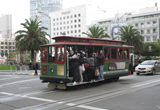 Back in my early days as a radical medical student (a small, select group in the Belfast of the early 1970s) one of the international figures I admired greatly was Angela Davis. I was amazed and delighted to find her billed as the main speaker at the closing session of the American Public Health Association’s annual meeting in San Francisco.
Back in my early days as a radical medical student (a small, select group in the Belfast of the early 1970s) one of the international figures I admired greatly was Angela Davis. I was amazed and delighted to find her billed as the main speaker at the closing session of the American Public Health Association’s annual meeting in San Francisco.
She still sports an afro hairstyle (admittedly of more modest dimension than in the 1970s) and her politics have lost none of their razor sharp radicalism. In her opening remarks she commiserated with all those affected by Hurricane Sandy while castigating the prominent politicians who in their statements ignored this latest screaming reminder that the world’s climate is changing and that human activity is to blame.
The main topic of her address to a large, packed beyond overflowing, conference hall was mass incarceration. She identified it as a major public health hazard in the United States, pointing to the gross racial inequality amongst those who were victims of what she and others term the “prison-industrial complex.” She condemned not only the racism inherent in who is incarcerated, but also to the growing proportion of women in the US prison population. The only company she identified by name, as part of this expansionist industry, was G4S—well known in the UK for their Olympics security fiasco.
Angela Davis categorised the problem of mass incarceration of black people and other racial problems in the US as products of the failure to fully abolish slavery. She also spoke of the plight of those that are termed “illegals.” She got one of many ovations when she stated, “No human being is illegal.” This view was echoed the same day on the streets just outside the conference hall by baseball star Sergio Romo, who wore a T-shirt with the slogan: “I just look illegal,” during the World Series victory parade by the San Francisco Giants.
A major part of her address dealt with the issue of Palestine and what she termed the “mass incarceration of the Palestinian people.” Her audience greeted her passion and support for the cause of Palestine more warmly than I would have expected. Interestingly however, it was studiously ignored by the official accounts of her speech put out by the US public health establishment.
 At the end of the proceedings she stayed and talked to many of the young women of colour who were moved and enthused by her speech. They thronged around a radical icon who, 40 years on, clearly has lost none of her appeal. As the Rolling Stones put it: “Sweet black angel.”
At the end of the proceedings she stayed and talked to many of the young women of colour who were moved and enthused by her speech. They thronged around a radical icon who, 40 years on, clearly has lost none of her appeal. As the Rolling Stones put it: “Sweet black angel.”
Earlier on the final day I had heard of important and brave public health advocacy being undertaken by academic scientists such as Tyrone Hayes on the agrochemical atrazine, and Steve Wing on the polluting effects of some of the disgusting intensive farms based on a process termed “Concentrated animal feeding operations.” All in all, by the end of the four day meeting I had heard more public health radicalism then I have heard in the last two decades in the UK.
 Finally; it amazed me just how dangerous San Francisco’s iconic cable cars really are. I saw several near misses whilst using them. They make London’s new hop on, hop off routemaster buses look like mollycoddling.
Finally; it amazed me just how dangerous San Francisco’s iconic cable cars really are. I saw several near misses whilst using them. They make London’s new hop on, hop off routemaster buses look like mollycoddling.
Gabriel Scally is professor of public health and planning at the University of the West of England and honorary professor at the University of Bristol.